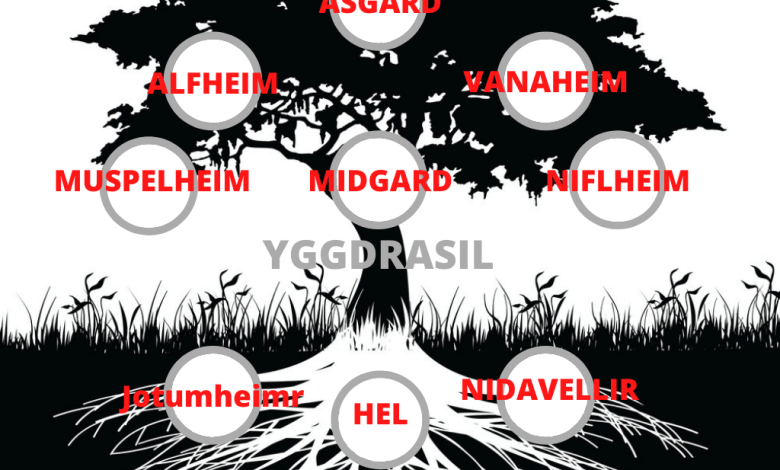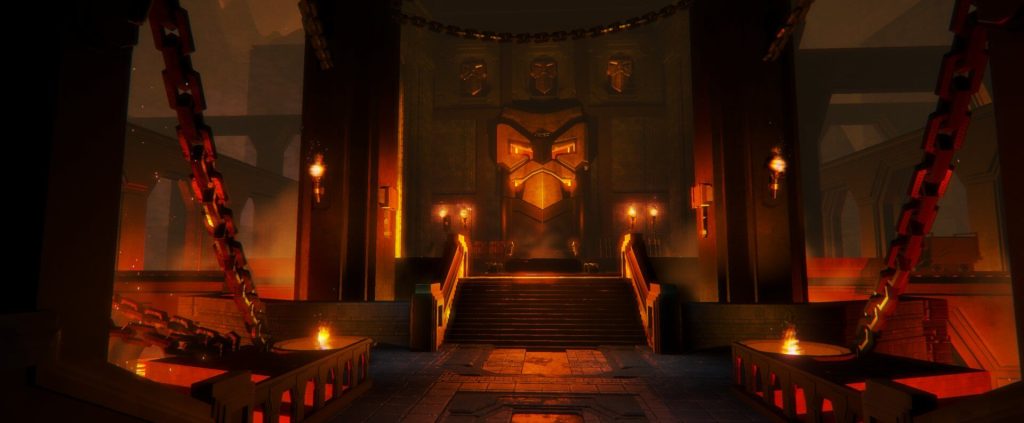
Norse Mythology is an important part of old Norse religion which was widely spread across the whole of Scandinavia and one of the important questions of Norse mythology is what are the nine realms of Norse mythology?
In this article, you will get a thorough research about all those nine realms of Norse Mythology. What and where are these nine worlds and how do these worlds work?
In reality, Norse religion was spread orally among its believers by its preachers and did not have any preserved written scriptures which would define its roots and give us the whole information about it.
But how do we know about Norse religion now when its preachers had long died? So thanks to Snorri Sturluson who is a 13th-century Historian and Poet who told us about the stories of Odin, Thor, and other Norse Mythology characters(the stories you saw in the Vikings series was also a version of Snorri’s interpretations).
Although some historians convict Snorri of changing some of its stories he is the only source of information for us now all real stories were told orally which is why we can not say that they reached us unchanged. So, we find more authenticity in the Snorri stories.
This article is also based on the stories about nine realms of Norse mythology told by the Snorri. All the stories of Norse Mythology trace its history to the Yggdrasil but what was that?
How Facebook Metaverse is Creating an entirely New World?
Yggdrasil and creation of nine realms of Norse Mythology

According to the Norse Mythology, there was a time when the universe just consisted of a sacred tree called the Yggdrasil and the void(world of nothing) and then from the Yggdrasil, nine worlds grew out which are known as the nine realms of Norse Mythology.
These nine worlds were for nine types of different beings that lived there and now and then visited each other’s realms. All these realms were arranged at different places of the Yggdrasil.
Top of the world on Yggdrasil is Asgard which is a place for the Aesir who were the Gods of the Norse Mythology living in one of the nine realms of Norse mythology e.g. Odin and Thor (Similar but not exactly of that which was shown in the Marvel series)
Popular Hand Guns Types on the basis of Functionality
Structure of Yggdrasil (division of Nine Realms)
Yggdrasil is a tree at the top of which is Asgard where Gods live and on the branches of this tree are four more realms of Norse mythology i.e. Muspelheim, Vanaheim, Alfheim, and Niflheim.
At the center of the Oak is placed the Midgard which is not only the home for the humans but also connects all other realms. Further down in the roots lies three more realms including Jotunheimr, Hel, and Nidavellir.
In this way, all the worlds were balanced among the branches and roots of the Yggdrasil.
How Nine Realms of Norse Mythology were like?
Asgard – Realm of the Aesir, joined to Midgard by the rainbow bridge Bifrost

This was the world for the Aesir Gods of Norse Religion and was a very civilized and orderly arranged place on the Yggdrasil. The Asgard which you have seen in the Marvel movies is not as same as that which is described in the Snorri tales but that is also an interpretation that describes some of the points of real Asgard.
This realm of Norse mythology of Norse Gods was joined to the Human world called the Midgard by a rainbow bridge named Bifrost. At one end of the bridge was Asgard and at the other end was the Midgard and just Gods could use this bridge to travel between both realms.
In this way the nine realms of Norse Mythology were connected with each other in some way.
This place is the most beautiful realm which is full of resources and treasures. This is also the place where the popular “Great hall of Odin” is present which is known as Valhalla.
Valhalla is the place where the Martyr Humans have feasts with Odin. This place is a heaven for every warrior.
Top 7 Best Norse Mythology Movies Ranked According to IMDb
Midgard – Realm of the Humans between Asgard and Jotunheim

Midgard was the home for humans and is considered the place we are residing now and as the name suggests it is at the central place on the Yggdrasil and also one of the important realms among all nine realms of Norse mythology because it was the place joining all other eight realms.
In Norse stories, this place is at the middle of the Yggdrasil and from this place, all other 8 worlds could be seen and these worlds are connecting to the Midgard at someplace.
This realm was surrounded by an Impassable ocean which was guarded by a Serpent named Jormungandr.
In the old myths, it is described that this place will be engulfed in the flames by the wrath of Ragnarok one day. It is also believed that the first two humans, Ash and Embla were sent to the Midgard and inhabited Midgard.
Why Greek Mythology in Literature is so Popular?
Alfheim – Realm of the Elves

Alfheim was somehow like a forest in the nine realms of Norse Mythology. It was the land for the Elves also known as the “Elfland” which was ruled by the Goddess Freya. There are not many sources of information for the land of Elves but they are described as very beautiful creatures living in the forests.
Elves are supposed to be very good Archers and of strong rules. They have pointed ears and a bright skin tone. According to the nature of ELves, this place is also considered very beautiful and lovely.
Hel – Realm of those who died of illness or old age and then of most people

One of the nine realms of Norse Mythology that is confused to exist or not in Norse mythology is “Hel” often confused with the Christian religion Hell. Hel is ruled by the Deity also named Hel.
But Hel is far different than Hell which is a place for suffering for the evils that anyone has performed in the world.
On the other hand, Hel is a place that is just the continuation of life after death in one of nine realms in Norse Mythology for those who have died their natural death.
What is the Meaning of Flight of Valkyries?(Norse Mythology)
Jotunheim – Realm of the Giants and Frost Giants

Jotunheim is the place for the Giants in Norse Mythology. This realm is described as an extremely cold place where just Frost Giants could survive the extremity of temperature.
All the giants were bitter enemies of the Gods living in Asgard. Some realms in Norse Mythology were ruled by the Gods while some are ruled by the Giants. That is how, all the nine realms of Norse Mythology were divided.
In Norse Mythology, this place has also been described as a place where Odin_the Allfather sacrificed one of his eyes to get wisdom. Loki_God of Mischief was also born here but was accepted by the Gods and given a place on Aesir.
Who is Havi in Norse Mythology? (Character of AC Valhalla)
Muspelheim – Realm of Fire, the fire-giant Surtr, and Surtr’s forces of chaos

This realm is the realm of Fire which is ruled by a fire giant named Surtr. This realm is one of those nine realms in Norse Mythology that are based on some elemental form. This realm consists of hot lava and flames everywhere.
This is also portrayed as the place from where Ragnarok will bring the flames for the destruction of Midgard. After the attack on Midgard by Ragnarok, Surtr will then attack the land of Aesir who are considered his bitter enemies.
Nidavellir/Svartalfheim – Realm of the Dwarves beneath the earth

This realm is associated with the Dwarfs who are short-height beings but experts in the Blacksmith abilities. The dwarves were so good in their craftsmanship that many of the important tools of Gods were made by them for the Gods.
In some old poems of Snorri, this also represents “new moon”. Dwarves created Thor’s hammer, Odin’s spear, and Frey’s ship.
It is mostly described as a dark smoky world that contains fires of forges burning at different places and giving some light to the place.
Circe Goddess in Homer’s Odyssey (The Legendary Witch)
Niflheim – Realm of Ice, Snow, and Mist near Muspelheim

Niflheim is often considered as a world in Norse Mythology which was created by Snorri himself. This Place is associated with “Mist and cold weather” where the light elves live.
According to Snorri, among all the nine realms of Norse Mythology, this is the first world that came out of the Yggdrasil tree. This world gets its cold rivers from Hvergelmir.
It is also narrated that a huge dragon named Nidhug is protecting this realm of Norse Mythology. This place is the place of fertility.
Vanaheim – Realm of the Vanir

Vanaheim is the world of Vanir who are also the Gods of Greek Mythology often considered the Intellectuals of the Gods. Freyr who is the Goddess of Fertility also came from Vanaheim.
There is a story of a war between the Aesir and Vanir and after that, the Vanir came to Vanaheim from the world of Aesir. But peace was established after their wars.
Know What Happened to Old Norse Religion Today? (Asatru)
Conclusion
Just like Greek Mythology, Norse Mythology is also a very popular subject of the world and the Nine realms of Norse Mythology gives the base to the Myths.
You will fine references to the nine realms of Norse Mythology in many literary pieces and as for the modern world in many movies.



